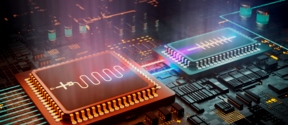Ship safety and innovation are the twin passions of Associate Professor Spyros Hirdaris

Spyros Hirdaris aims to study advanced hydrodynamics for monitoring, controlling and optimising the functional safety of ships in waves.
'Hydrodynamics research is significant for very large vessels, such as the cruise ships that are important to Finland and the container ships that form the backbone of international trade,’ says Professor Jani Romanoff of the Marine Technology Research Group.
‘Many factors affect the hull of a ship and its behaviour in heavy seas. A large wave may break the hull, while millions of small cycles of varying sizes may damage it through fatigue. Spyros Hirdaris is one of a few specialists capable of managing this whole and combining expertise from specialists of different fields,' Romanoff continues.
‘Risk-based safety connected to traffic management in the Finnish archipelago is also within my area of interest. We want to build models that can manage the risks of accidents that may happen to ships when they operate in these areas,’ says Hirdaris.
The risk identification and reduction of emerging technologies is an important part of this risk-based safety.
‘Many of the new technologies that can be implemented in ships and ship structures may create societal or engineering risks. For example, ship autonomy, use of big data, the internet of things or the use of advanced materials are things that interact with modern design and ship safety.”
Climate change requires new innovations
Climate change will have strong effects on the shipping industry. New regulations for marine traffic emissions and energy efficiency enter into force starting 2025, while vessels will have to contend with stormier seas and larger waves in the future.
‘In most areas, the height of waves has increased moderately – between 1–3 meters – but in the North Atlantic and other areas considered critical for trading, wave heights have grown even more, occasionally resulting in extreme phenomena,’ Hirdaris says.
The role of technology and maritime technology will be very important in order to find solutions to the challenges facing seafaring.
‘The maritime and shipbuilding industries require professionals who can design, develop and maintain new technologies.'
Educating skills for the future
In addition to research, Hirdaris looks forward to teaching. He believes that barriers between disciplines can be broken in both teaching and research and that both should strive toward systems thinking.
‘FITech is a bright example of how to create virtual knowledge hubs, an excellent demonstration of knowledge management and education. One possible example of the future of education would be an international combination of multiple fields and major subjects.’
‘Another key for enhancing education is to equip your graduates with skills expected by the global industry in the future. At the moment, this kind of thinking relates more to management courses, but it should also be implemented in maritime education. Mobility will be important in our area of work.”
Experience from industry and academia
Spyros Hirdaris draws from years of experience in research of mechanics, solid mechanics and design to improve ship safety.
He defended his dissertation in hydrodynamics in 2002 at the University of Southampton. After completing his doctoral degree, he was employed in international duties for several years by Lloyd’s Register at its strategic research and development department.
Hirdaris has participated in several research projects within the EU’s Seventh Framework Programme and has been a member of the International Ship Security Certificate (ISSC) organisation since 2005. He is a Chartered Engineer and a member of numerous international associations in the field, including the Royal Institution of Naval Architects (RINA), the Institution of Mechanical Engineers (IMechE) and the Technical Chamber of Greece.
‘Overall, I’m very happy that I have seen different aspects of maritime technology. I’m lucky to understand the role of research, innovation and education from the perspective of a university, a classification society, a shipbuilder, a ship owner… in this sense, I am able to address topical questions and problems as well as appreciate and respect different kinds of people. This is my mixed strength,’ says Spyridon Hirdaris.
‘I am proud to have Professor Spyros Hirdaris as a member of our research group. He has a large international network in the field of marine technology research and development and a wealth of experience in both academia and industry. Among his other achievements, Hirdaris has played a part in the development of international regulations concerning ships’ environmental and safety aspects,’ said Vice Dean Pentti Kujala of the School of Engineering.
Spyros Hirdaris, Associate Professor
[email protected]
https://www.aalto.fi/en/people/spyros-hirdaris
Read more news

Aalto in 2024: Love pictured in the brain, wooden crystals that make fashion shine, recovering minerals from wastewater and more
This year has been another feast of science and art at Aalto University
Researchers aim to correct quantum errors at super-cold temperatures instead of room temperature
One of the major challenges in the development of quantum computers is that the quantum bits, or qubits, are too imprecise. More efficient quantum error correction is therefore needed to make quantum computers more widely available in the future. Professor Mikko Möttönen has proposed a novel solution for quantum error correction and has received a three-year grant from the Jane and Aatos Erkko Foundation to develop it.
Two new assistant professors started at the Department of Electronics and Nanotechnology
Two new assistant professors were appointed in the Department of Electronics and Nanotechnology at Aalto University's School of Electrical Engineering. Read the interview with Kwantae Kim and Paul Verrinder.